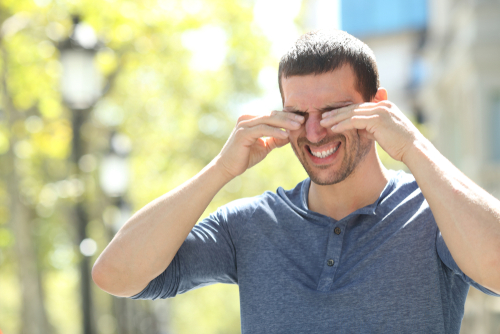Posted by: Eye Health Northwest in Dry Eyes on April 29, 2021

Do you find that your eyes are dry and itchy in the spring? Do you have allergies that amplify your dryness?
Dry eye is a widespread yet treatable condition. It has many causes including, extended screen use, your environment, and allergies.
If you develop dry eyes and have allergies, you could be in for a very uncomfortable allergy season. Luckily, there are lifestyle changes and treatments that you can use to combat your dry eyes.
Keep reading to learn how you can treat your dry eyes this spring.
What is dry eye?
Dry eye is a situation where you have irritated eyes that feel like they are stinging or burning. These symptoms can spring up due to common environmental conditions.
These environmental conditions can include being on an airplane, air blowing on your face, or too much time looking at screens. Such environmental stimuli are prevalent, so you must know how you can prevent dry eyes.
Usually, adults aged 50 and up develop dry eyes, and it is more common in women than men. But, anyone can develop dry eyes at any age.
How do you develop dry eyes?
There are two leading causes of dry eye. Both stem from problems with your tear production system.
One cause could be that you do not produce enough tears, in which case you will need treatment to stimulate tear production. The other is that you have low-quality tears.
Often in cases of low-quality tear production, your eyes over-produce the inferior tears. This leaves you with eyes that are always running but remain dry.
Tears must have the proper balance of oil, mucus, and water to keep your eyes healthy. Often, an ingredient is missing from your tears which results in inferior tears.
These inferior tears lack the nutrients your eyes need. They may not even be able to cover your eye entirely and will evaporate quickly. All this results in dry eyes for you.
What are signs of dry eye?
There are many signs and symptoms of dry eyes. Some include:
- A burning sensation
- Feeling like there is something in your eye
- Over or underproduction of tears
- Corneal and conjunctival staining
- Keratitis
- Eye fatigue
- Photophobia
- Light sensitivity
- Red eyes
- Trouble driving at night
- Discomfort with your contacts
- Discharge
- Eye pain
- Cloudy vision
Allergies can make any of these symptoms worse. For instance, itchy eyes are an allergy symptom.
The combination of itchy and dry eyes is very uncomfortable and may seem impossible to fix. You may want to rub your eyes to scratch the itch and hopefully produce some tears to soothe your eyes.
Do not ever rub your eyes for any reason, no matter how itchy they are! There are better ways to treat your dry, itchy eyes.
Why should I treat my dry eye in the spring?
Before allergy season fully begins, make sure to get your dry eyes under control. The combination of allergies and dry eyes could make you have a miserable spring.
If you get your dry eyes under control before allergy season, it will be easier to enjoy the warm sunny weather fully. Treat your dry eyes now, so your allergy symptoms interfere less with your life this spring.
How do you treat dry eyes?
There are many different ways to treat dry eyes. Some of them include:
- Drinking more water
- Using a humidifier to get more moisture in the air in your home or office
- Eating more foods high in omega-3 fatty acids
- Keeping eyedrops around your house and car for easy access
- Prescription eye drops
- Artificial tears and plugs for your tear ducts
Your eye doctor can help you find the best treatment for your situation.
Do you need help managing your dry eye? Schedule an appointment at EyeHealth Northwest in Portland, OR now to discuss the best dry eye treatment for you!

